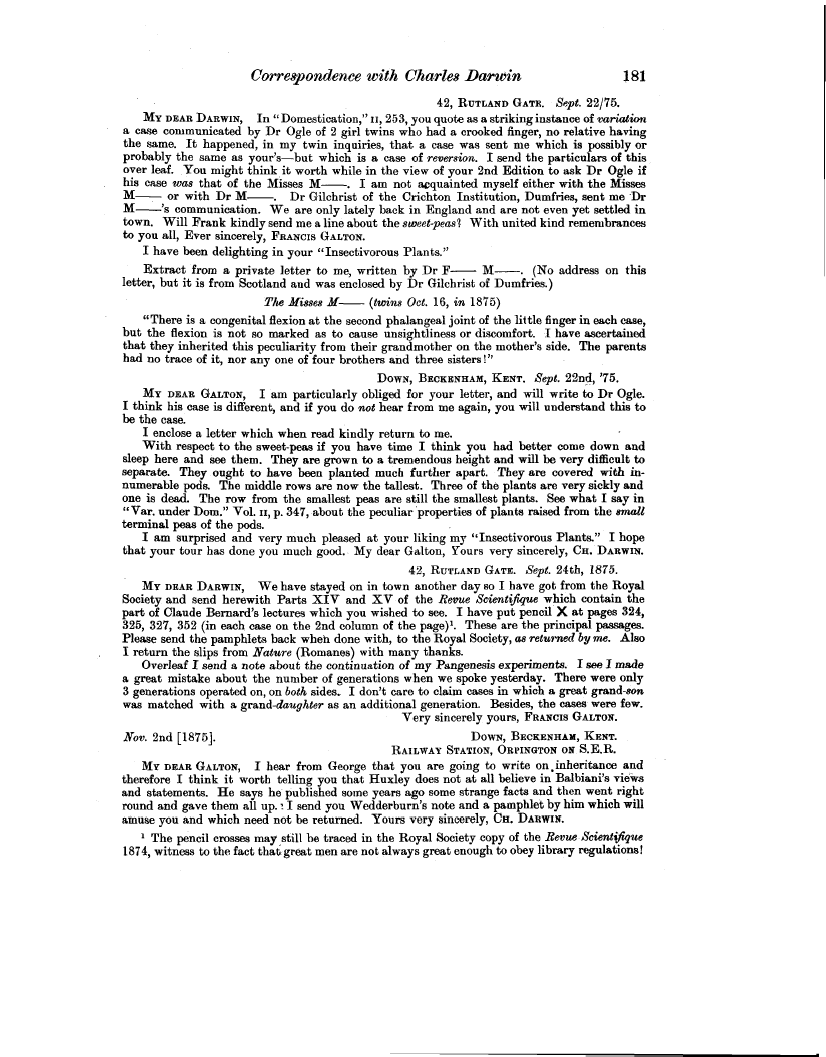Correspondence with Charles Darwin 181
42, RUTLAND GATE. Sept. 22/75.
MY DEAR DARWIN, In "Domestication," u, 253, you quote as a striking instance of variation a case communicated by Dr Ogle of 2 girl twins who had a crooked finger, no relative having the same. It happened, in my twin inquiries, that a case was sent me which is possibly or probably the same as your's-but which is a case of reversion. I send the particulars of this over leaf. You might think it worth while in the view of your 2nd Edition to ask Dr Ogle if his case was that of the Misses M . I am not acquainted myself either with the Misses M or with Dr M . Dr Gilchrist of the Crichton Institution, Dumfries, sent me Dr M 's communication. We are only lately back in England and are not even yet settled in town. Will Frank kindly send me a line about the sweet peas? With united kind remembrances to you all, Ever sincerely, FRANCIS GALTON.
I have been delighting in your "Insectivorous Plants."
Extract from a private letter to me, written by Dr F M (No address on this letter, but it is from Scotland and was enclosed by Dr Gilchrist of Dumfries.)
The Misses M (twins Oct. 16, in 1875)
"There is a congenital flexion at the second phalangeal joint of the little finger in each case, but the flexion is not so marked as to cause unsightliness or discomfort. I have ascertained that they inherited this peculiarity from their grandmother on the mother's side. The parents had no trace of it, nor any one of four brothers and three sisters!"
DOWN, BECBENHAM, KENT. Sept. 22nd, '75.
MY DEAR GALTON, I am particularly obliged for your letter, and will write to Dr Ogle. I think his case is different, and if you do not hear from me again, you will understand this to be the case.
I enclose a letter which when read kindly return to me.
With respect to the sweet-peas if you have time I think you had better come down and sleep here and see them. They are grown to a tremendous height and will be very difficult to separate. They ought to have been planted much further apart. They are covered with innumerable pods. The middle rows are now the tallest. Three of the plants are very sickly and one is dead. The row from the smallest peas are still the smallest plants. See what I say in "Var. under Dom." Vol. II, p. 347, about the peculiar properties of plants raised from the small terminal peas of the pods.
I am surprised and very much pleased at your liking my "Insectivorous Plants." I hope that your tour has done you much good. My dear Galton, Yours very sincerely, CH. DARWIN.
42, RUTLAND GATE. Sept. 24th, 1875.
MY DEAR DARWIN, We have stayed on in town another day so I have got from the Royal
Society and send herewith Parts XIV and XV of the Revue Scientifique which contain the
part of Claude Bernard's lectures which you wished to see. I have put pencil X at pages 324, 325, 327, 352 (in each case on the 2nd column of the page)'. These are the principal passages. Please send the pamphlets back wheh done with, to the Royal Society, as returned by me. Also I return the slips from Nature (Romanes) with many thanks.
Overleaf I send a note about the continuation of my Pangenesis experiments. I see I made a great mistake about the number of generations when we spoke yesterday. There were only 3 generations operated on, on both sides. I don't care to claim cases in which a great grand-son was matched with a grand-daughter as an additional generation. Besides, the cases were few.
Very sincerely yours, FRANCIs GALTON.
Nov. 2nd [1875]. DOWN, BECRENHAM, KENT. RAILWAY STATION, ORPINGTON ON S.E.R.
MY DEAR GALTON, I hear from George that you are going to write on, inheritance and therefore I think it worth telling you that Huxley does not at all believe in Balbiani's views and statements. He says he published some years ago some strange facts and then went right round and gave them all up.! I send you Wedderburn's note and a pamphlet by him which will amuse you and which need not be returned. Yours very sincerely, CH. DARWIN.
' The pencil crosses may still be traced in the Royal Society copy of the Revue Scientifique 1874, witness to the fact that great men are not always great enough to obey library regulations!

